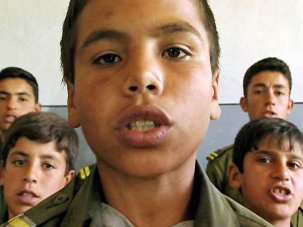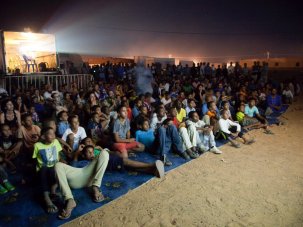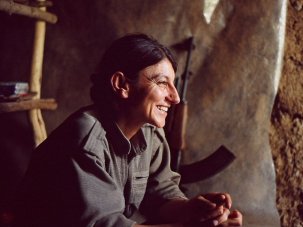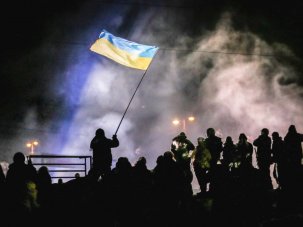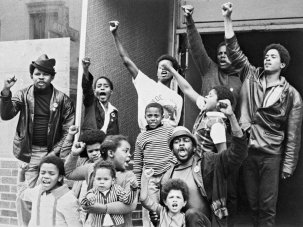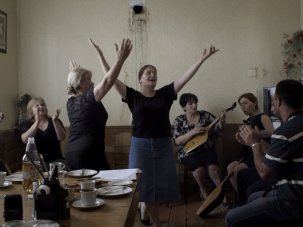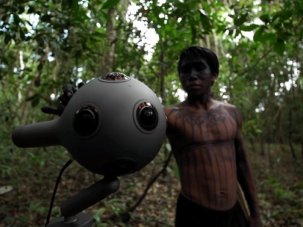So far, the war in Syria has displaced 13 million people and killed half a million. Refugees eke out an existence in refugee camps in Turkey, Lebanon and Jordan or risk their lives to seek asylum further afield.
City of Ghosts had its UK premiere at Sheffield Doc/Fest in June 2017 before going on UK cinema release, is now available on VOD and will be released on DVD on 2 October 2017.
Syrian Stories: Suspended Lives and Radio Kobani also had their UK premieres at Sheffield Doc/Fest in June 2017.
Taste of Cement opens the Open City Documentary Festival on 5 September 2017.
Reflections on Syria takes place on 13 August at the Edinburgh International Festival.
A glut of recent films conveys the destruction wrought both by Bashar al-Assad’s regime and, in some parts of the country, by Isis. The films have great immediacy, incorporating footage from on-the-ground activists.
Matthew Heineman’s just-released City of Ghosts follows a group of citizen journalists who call themselves Raqqa Is Being Slaughtered Silently (RBSS). The men demonstrate for “freedom, justice, equality, dignity” but as their comrades are killed and they themselves are threatened, they flee, relying on remaining contacts in Syria to send images of atrocities so they can raise awareness in the wider world online. Heineman uses Raqqa Is Being Slaughtered Silently’s footage to track Isis as it exploits the power vacuum left by the revolution and there are horrifying clips of masked Isis operatives executing men, decapitated bodies, heads on spikes, tortured civilians and brainwashed children, alongside slick Isis recruitment videos.
City of Ghosts is a punchy, easy-to-remember recent history. Heineman befriended the exiled activists but the most compelling footage in the film is theirs, not his. Their own experience is a galling one: they live in Germany where they witness racist, anti-Muslim demonstrations; alternatively they are applauded by tearful rich white Americans at a human rights awards ceremony in New York. Despite risking their lives to document human rights abuses in Syria, as asylum seekers in Europe they have no right to work, let alone pursue glitzy directorial careers.
Taste of Cement, by Ziad Kalthoum, which opens this year’s Open City Documentary Festival in London, offers a more impressive artistic vision, shooting exiled Syrian labourers on building sites in Lebanon. It’s made on an epic scale, with astounding detail and widescreen majesty thanks to the film’s director of photography Talal Khoury.
Taste of Cement trailer
Ultimately, however, Taste of Cement’s message is a basic one. The Beirut megalopolis is contrasted with Internet images of shelled, devastated buildings in Syria and citizens pulling other citizens out of the rubble with their bare hands. The exiled workers have no dialogue and are shot in ruminative isolation as they act out the painfully blunt symbolism of invisibly, namelessly and silently building luxury homes for people who don’t want them, after the destruction of their own homes.
Films like these are obvious in imagery, narrative and intent. Their use of free online footage by imperilled activists is will be familiar to anyone who wants to go deeper into Syrian history and recent Syrian film. City of Ghosts reminded me of Talal Derki’s 2013 film Return to Homs, in which two ordinary young men are politicised into active resistance.
The White Helmets trailer
Similarly, Orlando von Einsiedel’s well known short The White Helmets (available on Netflix), which follows a team of first responders reacting to Assad’s airstrikes, is a strong influence on Last Man in Aleppo, which literally covers the same ground. So does Evgeny Afineevsky’s 2017 documentary Cries from Syria, with its footage of bomb blasts, howling panic, open gunfire, grieving relatives, traumatised children and revolutionary leaders.
The nadir of this type of film is Hell on Earth: the Fall of Syria and the Rise of Isis (2017) by Sebastian Junger and Nick Quested, who stitched their narrative together from news bulletins, Human Rights Watch reports, Isis propaganda films and, yep, Syrian citizen journalists, all in an editing suite far from any political or personal threat.
Beyond sensationalism
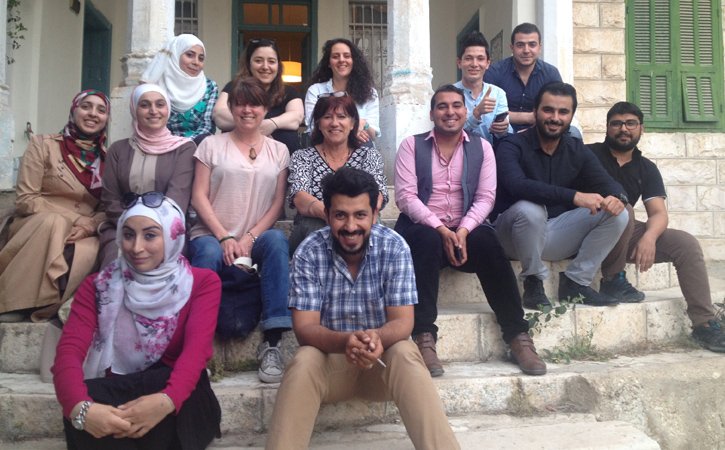
Suspended Lives (2017)
The international film industry is doing Syria a disservice in granting deals, publicity and distribution only to those directors who have a hard-on for war games and who harvest free, graphic footage taken at great risk to present the most macho, sensationalist and simplistic films. To really understand what’s happening in Syria and perceive the depth of its citizens’ pain, the Syrian experience should not be recounted by excited interlopers who will get whatever they can to help their own profile and then drop it like a hot rock as soon as another enticing catastrophe comes along.
As well as their narrative simplicity, grainy aesthetic, hysterical titles and shocking imagery, many of these films have something else in common: male directors, male heroes, male villains, male victims, male freedom fighters, male rebels and no women anywhere. I would like to see more consideration given to films which break away from the harsh live-news aesthetic and allow space for both sexes and all ages of survivors, exiles, commentators and activists.
Lost in Lebanon (2017), by Georgia and Sophia Scott, goes some way to achieving this. Filmed in a refugee camp in Lebanon, the film records the daily life of frustrated residents, including a handsome artist caught between creativity and alcoholic escape and an impressive young woman, Reem, whose hopes of becoming an architect were shattered after she was blacklisted in 2012 for protesting against the regime. She is repeatedly offered places on international youth leadership schemes, only to see her visa applications rejected.
Lost in Lebanon trailer
The documentary has something to say about the repetition and layered traumas of conflict, pointing out that a refugee camp now used for Syrians was originally set up in 1948 for Palestinians. Violent displacement is not a new phenomenon; indeed it is centuries old, and creates cycles of rage and pain. Reem talks about witnessing child suicides, and of the children having witnessed war, death, murder and torture. “These kids are live bombs. This is how you create terrorists,” she says – a stark warning.
The most extraordinary transformation that I have seen in the current raft of Syrian films on refuge came from a project in Amman, part of the Hakaya Souria (Syrian Stories) programme which is a partnership between the British Council, the Scottish Documentary Institute and Bidayyat for Audiovisual Arts. The resulting short film is called Suspended Lives (by Hiba Zaheer Hamdi, Esraa Abdulhamid Ibrahim Away and Hohammad Azmat Al-Labbad), and focuses on a former Assad army commander who has defected after 35 years and finds himself in exile in Jordan.
His wife expresses her loss of faith in the regime and challenges her husband: “You are a respected man yet it didn’t matter to them.” It is this least likely speaker who sums up the powerful heartache of the exile: “I miss cooking lunch, sitting around and eating together… I never imagined that one day I would be called a refugee.”
Suspended Lives trailer
The best Syrian films balance their ‘emergency cinema’ shots of mutilated bodies and mutilated buildings with visual and psychological sophistication. They contain a considered criticism of the regime; an underlying theme of flight and exile, claustrophobia and intolerability; they do not ignore women; they reflect multiple generations’ resistance against Isis, against Bashar al-Assad and against his father Hafez al-Assad; yet they never let go of the future.
The War Show (2016), by Obaidah Zytoon, Andreas Dalsgaard and Alaa Hassaan, tells the story of the 2011 revolution through subjects who are idealists, even hipsters, a cohort of writers and artists whose peaceful moves towards freedom are brought under increasing threat, which increases their determination.
The War Show trailer
Reber Dosky’s Radio Kobani (2016) meanwhile contends that domination by Isis is not some inevitable endpoint. In the Isis-destroyed city of Kobani, reporter Dilovan Kiko starts a radio station and interviews rebels, survivors and fellow intellectuals. While there is the never-not-horrifying footage of broken corpses hanging out of road diggers, the overall message, conveyed by the warm, soft filming technique, is of young people with faith in the future.
Radio Kobani trailer
This July the Bafta-nominated film producer Elhum Shakerifar curated a selection of Syrian films for the Shubbak Festival of contemporary Arab culture. Her choices compounded the effect of The War Show and Radio Kobani in expressing the repeating consequences of the war, in ways which were emotionally rigorous, politically charged and creatively sophisticated.
Ammar Al-Beik’s 2014 film La Dolce Siria uses found footage, including clips made by Assad’s own soldiers inside a helicopter as they cheerfully drop bombs on towns beneath. This is intercut, with heavily symbolism, by unrelated footage from a foreign circus, in which a team of lions get riled and maul their trainers while spectators scream in horror. ‘Assad’ means lion – and the criticism of the regime would hardly be lost on any Syrian watching.
I was particularly struck by the 2016 fiction short Mare Nostrum (available on demand from Vimeo), by Anas Khalaf and Rana Kazkaz, both Syrians from Damascus who now live in Jordan. Lyrical, wordless and sinister, Mare Nostrum shows a man living on the Mediterranean shore repeatedly hurling his little daughter into sea to teach her how to calmly tread water. She is traumatised and doesn’t know why he’s doing it; but when they flee Syria in the dark and attempt to escape by water, she is the only survivor.
Mare Nostrum trailer
Reem Ali’s haunting 2006 documentary Foam (Zabad; available to watch on Vimeo) starts off as a gentle fly-on-the-wall story about a Syrian couple living out their life. It soon turns into a devastating portrait of the effects of oppression, as it emerges that the couple were communists in their youth and survived imprisonment and torture by the elder Assad’s regime.
The woman’s father was a wife-beater and this becomes a heavy symbol of inescapable dictatorial sadism with long consequences. The family now talk obsessively about wanting to leave – and the deadly, pressure-cooker atmosphere of this film, made five years before the 2011 revolution, looks ahead to that bubbling-over of resentment and claustrophobia.
The harshest effects of decades of dictatorship and war (Hafez al-Assad came to power in 1971; Bashar took over in 2000) and war will be on the country’s young. Half of Syrian children have PTSD, according to Obscure (2017), a documentary by Soudade Kaadan. Obscure follows a young refugee, Ahmed, whose silence, mistrust and disengagement are intercut with footage of what he and other children have witnessed: rotted bodies, army torture and dead families.
Meanwhile a six-year-old girl describes how, under Isis, “whoever wasn’t wearing black on the bus was taken off it and beheaded” and how “there’s no one left in Syria. There are a lot of dead people on the TV. The girls are at home all wearing black.” Obscure counters the tragedy of trauma by following the painstaking work of a child psychologist who, through art therapy, transforms children back into children, rather than a shell-shocked victims.
Rage and resilience
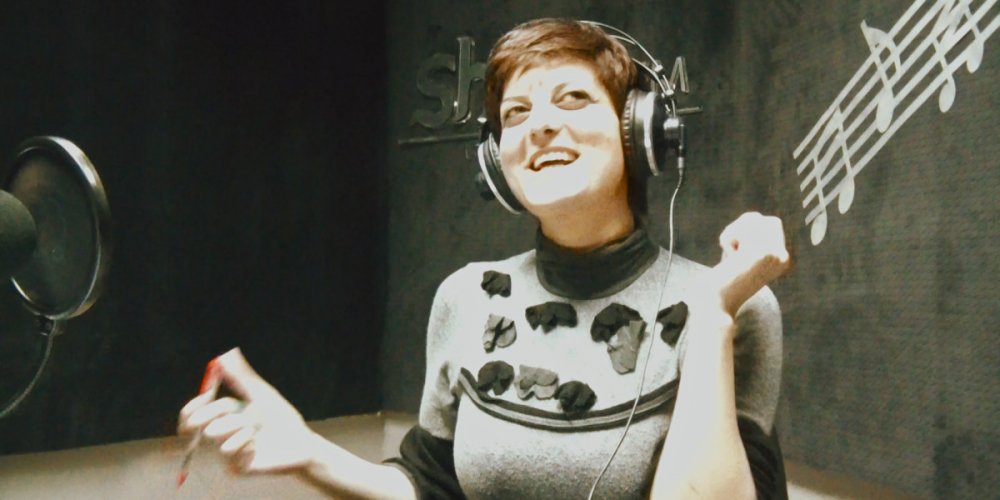
The War Show (2016)
Films such as these enable the narrative on Syria to become more nuanced, through Syrian directors telling their own stories thoughtfully, from the inside out. At this year’s Edinburgh International Festival an event called Reflections on Syria will screen several short films including Besieged Bread (2016), an impressive fiction short by Obscure director Soudade Kadaan.
An urgent, witty actioner, it gives both a symbolic and literal expression of citizens trapped by the violence and deprivations of war. In a barren landscape, a woman smuggling bread to citizens under siege encounters an army defector. They eat together, despite their paranoia and fear, trapped between two roads, which are both patrolled by the army.
Besieged Bread trailer
The curator of Reflections on Syria, Yasmin Fedda, is an award-winning filmmaker whose 2014 documentary Queens of Syria is a modern classic of politically defiant, psychologically powerful, artistically arresting film.
The documentary follows 50 Syrian women refugees in Jordan as they create, rehearse and perform the 2,500 year old ancient Greek tragedy Trojan Women, about women’s experience of war. The women in the film are not the beautiful young revolutionaries or equally beautiful young traumatised victims beloved of Western news channels. What they (re)create is a timeless pain lament, a howl of rage at warlike men’s folly, an expression of resilience, a show of unity and a creative and recuperative act in itself.
Queens of Syria trailer
Queens of Syria is staggeringly powerful, but its message about the horrors of war and the cruelty of dictators still goes unheard, centuries and generations on. Indeed, Mare Nostrum’s directors are currently completing a full-length feature, The Translator, in which drama-trained Syrian refugees in Jordan act out the story of a Syrian refugee in Australia returning home to join his brother in the 2011 revolution. When the brother is arrested by Bashar al-Assad’s forces, the siblings remember their father being arrested 30 years earlier, by Bashar’s father.
At the moment, Syria’s story is still one of devastation, of a long regime harming its own people and sadistic opportunists stepping into their breach to live out their death squad fantasy. But it is also about witnesses and survivors, however brutalised. Syria’s people may be refugees, exiles, traumatised and bereaved – but they are not dead, and they still find ways to exist, commune, converse, interpret and create. The least the international film community can do is go beyond shock tactics and listen to what Syria’s filmmakers, female and male, old and young, have to show us, in their own words and images.
Correction (7 August 2017): this feature originally described Queen of Syria’s director Yasmin Fedda as Syrian. This was incorrect and we have removed the description.
-
The Digital Edition and Archive quick link
Log in here to your digital edition and archive subscription, take a look at the packages on offer and buy a subscription.





